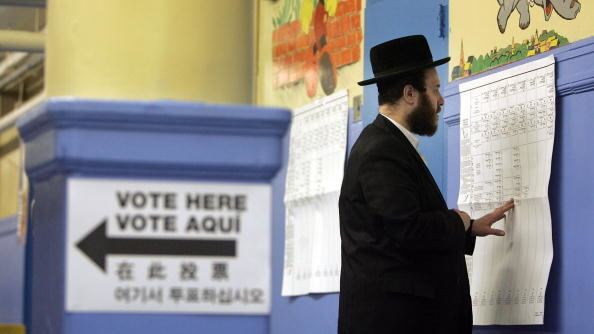Yesterday, at an Uri L’Tzedek lecture on “the power of the Jewish vote,” I came across an amazing, little-known bit of Jewish responsa literature. This teshuva—literally, an “answer” given to a question asked by the Jewish community—was penned on October 3, 1984 by Rabbi Moses Feinstein, Orthodox Jewry’s foremost modern legal authority. Asked whether Jews have an obligation to vote in American elections, Rabbi Feinstein wrote:
On reaching the shores of the United States, Jews found a safe haven. The rights guaranteed by the United States Constitution and the Bill of Rights have allowed us the freedom to practice our religion without interference and to live in this republic in safety.A fundamental principle of Judaism is hakaras hatov—recognizing benefits afforded us and giving expression to our appreciation. Therefore, it is incumbent on each Jewish citizen to participate in the democratic system which guards the freedoms we enjoy. The most fundamental responsibility incumbent on each individual is to register and to vote.Therefore, I urge all members of the Jewish community to fulfill their obligations by registering as soon as possible, and by voting. By this, we can express our appreciation and contribute to the continued security of our community.

When this teshuva was read aloud at yesterday’s lecture, the (mostly Orthodox) audience went wild for it. They liked the idea that Jews are obligated to vote, and they loved the idea that that obligation is rooted in the Jewish injunction to express gratitude—in this case, gratitude for America’s constitutional rights and freedoms.
But if you take a moment to think about it, there’s more to Rabbi Feinstein’s concept of gratitude than meets the eye. In fact, this election cycle, his decades-old teshuva is more relevant than ever.
As November 6 draws near, the GOP is redoubling its efforts to win Jewish votes away from Obama by tarnishing the sitting president’s relationship with Israel. Obama and Bibi can’t get along, we’re told. Obama has thrown Israel under the bus, we’re told. By September 23, the discourse had sunk so low that, when Obama uttered what should have been a thoroughly uncontroversial statement—“When it comes to our national security decisions, any pressure that I feel is simply to do what’s right for the American people. And I am going to block out any noise that’s out there”—all hell broke loose. Right-wingers attacked Obama for “insulting” and “snubbing” the Jewish state, even though he’d simply expressed the fact that, for him, the American people come first, and even though he then went on to express support for Israel, practically in the same breath.
This kind of discourse enacts, I would argue, the exact opposite of hakaras hatov. Instead of expressing gratitude for a democratic system that takes as its highest priority “what’s right for the American people,” that safeguards Americans’ ability “to live in this republic in safety”—something Rabbi Feinstein clearly championed—it evinces a disturbing disregard for domestic wellbeing. Which, unfortunately, is part of a larger trend among American Jewish organizations: Though they once regularly addressed everything from civil rights to labor unions, they now speak out almost exclusively on Israel issues and remain weirdly agnostic on questions of domestic policy.
So, as we gear up for tonight’s presidential foreign policy debate, we’d do well to bear in mind Rabbi Feinstein’s implicit statement that voting in American elections is ultimately about showing appreciation for America—and not, contra polarizing campaign videos and billboards, about showing fealty to Israel.






